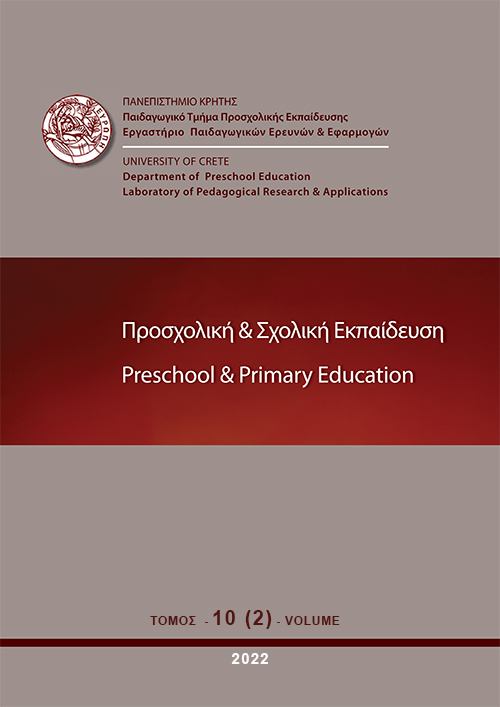Απόψεις εκπαιδευτικών πρωτοβάθμιας εκπαίδευσης για τη διαταραχή ελλειματικής προσοχής- υπερκινητικότητας

Περίληψη
Οι εκτιμήσεις των εκπαιδευτικών για τα παιδιά με ΔΕΠ-Υ καθορίζουν τη μαθησιακή τους πορεία, επηρεάζουν την εικόνα εαυτού που διαμορφώνουν καθώς και τα επίπεδα κοινωνικής αποδοχής από τους συνομήλικους τους. Ωστόσο, ο τρόπος διαχείρισης των συμπτωμάτων της ΔΕΠ-Υ από τους εκπαιδευτικούς στη χώρα μας δεν έχει προσδιοριστεί επαρκώς. Στόχος της παρούσας έρευνας είναι να διερευνηθούν οι πεποιθήσεις των Ελλήνων εκπαιδευτικών πρωτοβάθμιας εκπαίδευσης γενικής αγωγής για τους μαθητές και τις μαθήτριες με ΔΕΠΥ. Οι παράμετροι που συνδέονται με την αντιμετώπιση των δυσκολιών που εμφανίζονται στη τάξη όπου φοιτούν μαθητές με ΔΕΠ-Υ αποτυπώθηκαν με την ηλεκτρονική χορήγηση ερωτηματολόγιου αυτο-αναφοράς, ανοιχτών ερωτήσεων σε 19 εκπαιδευτικούς πρωτοβάθμιας εκπαίδευσης της γενικής αγωγής. Η επεξεργασία των δεδομένων βασίστηκε στις αρχές της διασταυρωμένη ανάλυσης των δεδομένων. Από τα αποτελέσματα της έρευνας προκύπτει ότι η διαχείριση των δυσκολίων των συγκεκριμένων μαθητών δεν μπορεί να είναι αποδοτική με τους παραδοσιακούς παιδαγωγικούς τρόπους. Οι εκπαιδευτικοί, ακολουθώντας το ατομικό-ιατρικό μοντέλο διαχείρισης των συμπεριφορικών δυσκολιών, κρίνουν σημαντική την εξατομικευμένη ψυχο-εκπαιδευτική υποστήριξη των παιδιών με ΔΕΠ-Υ, όχι από τους ίδιους τους εκπαιδευτικούς αλλά από εξειδικευμένο εκπαιδευτικό προσωπικό. Συμπερασματικά, προκρίνεται ο επαναπροσδιορισμός του διακριτού ρόλου των εκπαιδευτικών γενικής αγωγής της πρωτοβάθμιας εκπαίδευσης αναφορικά με τη διαχείριση των μαθητών με ΔΕΠ-Υ εντός της σχολικής τάξης.
Λεπτομέρειες άρθρου
- Πώς να δημιουργήσετε Αναφορές
-
Βασιλειάδης Η., Βλειώρας Γ., Τσερμεντσελή Σ., & Τσακνάκη Α. (2022). Απόψεις εκπαιδευτικών πρωτοβάθμιας εκπαίδευσης για τη διαταραχή ελλειματικής προσοχής- υπερκινητικότητας. Preschool and Primary Education, 10(2), 175–195. https://doi.org/10.12681/ppej.28612
- Ενότητα
- Άρθρα

Αυτή η εργασία είναι αδειοδοτημένη υπό το CC Αναφορά Δημιουργού – Μη Εμπορική Χρήση – Παρόμοια Διανομή 4.0.
Οι συγγραφείς των άρθρων που δημοσιεύονται στο ΠΡΟΣΧΟΛΙΚΗ & ΣΧΟΛΙΚΗ ΕΚΠΑΙΔΕΥΣΗ διατηρούν τα δικαιώματα πνευματικής ιδιοκτησίας επί των άρθρων τους, δίνοντας στο περιοδικό το δικαίωμα της πρώτης δημοσίευσης. Άρθρα που δημοσιεύονται στο ΠΡΟΣΧΟΛΙΚΗ & ΣΧΟΛΙΚΗ ΕΚΠΑΙΔΕΥΣΗ διατίθενται με άδεια Creative Commons 3.0 και σύμφωνα με την άδεια μπορούν να χρησιμοποιούνται ελεύθερα, με αναφορά στο/στη συγγραφέα και στην πρώτη δημοσίευση για μη κερδοσκοπικούς σκοπούς και με δικαίωμα τροποποίησης μόνον με παρόμοια διανομή (αν αναμείξετε, τροποποιήσετε, ή δημιουργήσετε πάνω στο υλικό, πρέπει να διανείμετε τις δικές σας συνεισφορές υπό την ίδια άδεια όπως και το πρωτότυπο). To Εργαστήριο Παιδαγωγικών Ερευνών και Εφαρμογών του Παιδαγωγικού Τμήματος Προσχολικής Εκπαίδευσης του Πανεπιστημίου Κρήτης και το Εθνικό Κέντρο Τεκμηρίωσης διατηρούν το δικαίωμα να δημοσιεύουν, να αναπαραγάγουν, να παρουσιάζουν στο κοινό, να διανέμουν και χρησιμοποιούν άρθρα που δημοσιεύονται στο ΠΡΟΣΧΟΛΙΚΗ & ΣΧΟΛΙΚΗ ΕΚΠΑΙΔΕΥΣΗ σε οποιοδήποτε μέσο και μορφή είτε μεμονωμένα είτε ως μέρη συλλογικών έργων, για όλο το χρόνο διάρκειας προστασίας της πνευματικής ιδιοκτησίας και για όλες τις χώρες του κόσμου. Αυτό περιλαμβάνει ενδεικτικά και όχι αποκλειστικά, το δικαίωμα δημοσίευσης των άρθρων σε τεύχη του περιοδικού ΠΡΟΣΧΟΛΙΚΗ & ΣΧΟΛΙΚΗ ΕΚΠΑΙΔΕΥΣΗ, αναπαραγωγής και διανομής μεμονωμένων αντιγράφων των άρθρων, αναπαραγωγής ολόκληρων των άρθρων σε άλλη έκδοση του Εργαστηρίου Παιδαγωγικών Ερευνών και Εφαρμογών του Παιδαγωγικού Τμήματος Προσχολικής Εκπαίδευσης του Πανεπιστημίου Κρήτης και του Εθνικού Κέντρου Τεκμηρίωσης και αναπαραγωγής και διανομής των άρθρων ή περίληψης αυτών με χρήση πληροφορικού συστήματος αποθετηρίου.


